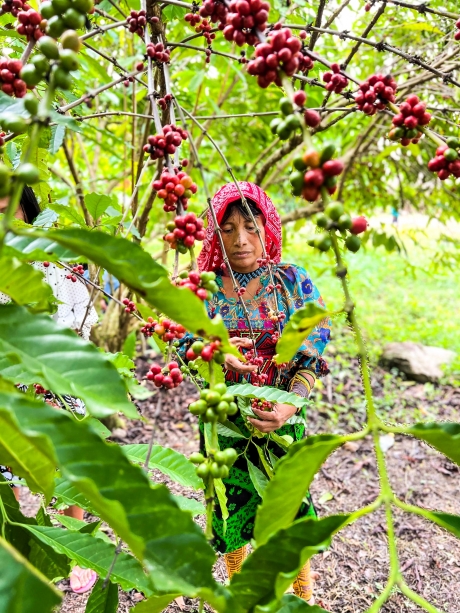The hands behind a cup of coffee in Panama
Sustainable coffee production techniques build on Indigenous Peoples’ traditional knowledge
Long before the sun rises above the towering trees of the Panamanian rainforest, Elizabeth Méndez, a Guna Indigenous Woman, wakes up to the sound of her rooster crowing. She lives in a house made of bamboo and thatch, nestled deep in the lush green forests. This is where she and her family have been growing coffee for generations.
Elizabeth’s busy day begins with the distinct aroma of freshly brewed coffee, which for her, signifies much more than a morning kickstart to her day.
Coffee has long been an important source of income for many Indigenous Peoples in Panama. But, in recent years, these communities have struggled to maintain their traditional methods of production.
“I’ve been harvesting coffee since I was a little girl, but sometimes we didn’t understand what was going on with the plant: sometimes it looked sick, sometimes it would not yield much,” says Elizabeth.
“The other main challenge we’ve always faced is where and how to sell the coffee. When we harvest, sometimes we have nowhere to sell it and sometimes we sell it cheap,” she adds.
With the advent of an innovative project called “Support for post-COVID economic recovery for Indigenous coffee producers,” this is hopefully a scenario of the past for the coffee farmers in the Ngäbe, Guna, Emberá and Wounaan Indigenous Peoples’ communities participating in the project.
The project is an initiative of the Inter-American Development Bank (IDB) with funding from the Japan Special Fund Poverty Reduction Program. It was implemented with the technical assistance of the Food and Agriculture Organization of the United Nations (FAO) and with the support of Panama’s Ministry of Agricultural Development, as well as coffee company, Café Durán. The project’s goal was to increase the income of Indigenous coffee producers by enhancing the production, processing, quality and sales of coffee from sustainable agroforestry.
More than 150 Indigenous coffee farmers from four communities completed a season-long, FAO Farmers Field Schools’ training in sustainable agroecological practices that enhance resilience to climate change and improve the quantity and quality of production while being aligned with and building upon Indigenous Peoples’ traditional knowledge and cultural practices.
These agroecological techniques include minimizing the use of pesticides and adapting agricultural technologies to face the effects of climate change. Through guided discussion and observation, coffee farmers were empowered to become experts in ecology and oversee the agricultural management of their own coffee crops. The training also included learning activities to increase women’s participation in production and business decision-making.
“Thanks to the training, we’ve learned all about coffee management and how we can take care of plants when they get sick. All of this without the need to put aside our traditional techniques, and while preserving our ancestral native plants,” says Elizabeth.

